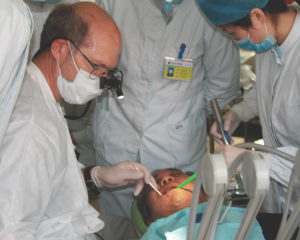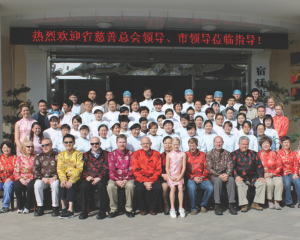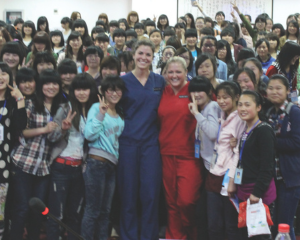Volunteering in Central America and Cambodia: For the Big-Hearted, Not the Faint of Heart
Following is a synopsis of the experiences of Carl D. Werts, DDS, FAGD. To read the full version, visit agd.org/werts.
 I started going on mission trips in 2008 after the economy tanked and I faced a crisis in my office. Days with no patients left me with time on my hands, so I looked for ways to make a difference. I visited a patient involved with the homeless community of Skid Row in Los Angeles, helping them find housing. When I asked about their dental care, he referred me to LA Christian Health Centers. Out of curiosity, I went there and was quickly asked when I could start. Despite not having done extractions in over 30 years, I was thrown into the role, learning on the spot. I quickly found that I enjoyed oral surgery, and, over time, I expanded my skills to do almost everything in dentistry. This led me to volunteer once a month at LA Christian Health Centers for the past 16 years, an experience that has given me perspective on life by working with those less fortunate.
I started going on mission trips in 2008 after the economy tanked and I faced a crisis in my office. Days with no patients left me with time on my hands, so I looked for ways to make a difference. I visited a patient involved with the homeless community of Skid Row in Los Angeles, helping them find housing. When I asked about their dental care, he referred me to LA Christian Health Centers. Out of curiosity, I went there and was quickly asked when I could start. Despite not having done extractions in over 30 years, I was thrown into the role, learning on the spot. I quickly found that I enjoyed oral surgery, and, over time, I expanded my skills to do almost everything in dentistry. This led me to volunteer once a month at LA Christian Health Centers for the past 16 years, an experience that has given me perspective on life by working with those less fortunate.Volunteering in China and Central America
During the time I was volunteering in Los Angeles, I attended a course taught by Dr. Karl Koerner. He mentioned a dental mission he arranges annually to China. Since I had just developed proficiency in oral surgery, I volunteered and was accepted. It was a great experience — I was able to bond with the team, the patients were grateful, and I got to experience China in a unique way, far from the typical tourist path.
A few years later, I joined Los Medicos Voladores (LMV) — “The Flying Doctors” — an organization that primarily works in Baja California, Mexico, but also runs annual missions to Central America. In 2016, I joined a trip to Guatemala, and, since then, I’ve made it an annual mission.
Cambodian Health Professionals Association of America
Through LMV, I met a psychiatrist who invited me to join a 2018 mission to Cambodia with the Cambodian Health Professionals Association of America (CHPAA). The mission was large, with around 125 volunteers from the U.S., and we worked alongside a Cambodian team. Cambodia was eye-opening. Many of the people over age 50 had survived the Killing Fields under brutal dictator Pol Pot in the 1970s, and the founders of CHPAA were medical professionals who had fled to Thailand, trained in the United States, and had returned to help their people. This organization is purely humanitarian, with no political or religious affiliations.
 The missions are volunteer-based, and we cover our own expenses — airfare, meals, lodging — while the rest is funded by donations. The amazing people I meet on these trips, both volunteers and patients, make the experience so rewarding. In Cambodia, I began as a volunteer dentist and later helped organize the dental department, eventually growing our team to 25 dentists, hygienists and dental students. Our goal is to teach and share knowledge while also providing treatment, mainly extractions. Since my first trip in 2018, I have returned to Cambodia in 2019, 2023 and 2024, and I will be going again this year.
The missions are volunteer-based, and we cover our own expenses — airfare, meals, lodging — while the rest is funded by donations. The amazing people I meet on these trips, both volunteers and patients, make the experience so rewarding. In Cambodia, I began as a volunteer dentist and later helped organize the dental department, eventually growing our team to 25 dentists, hygienists and dental students. Our goal is to teach and share knowledge while also providing treatment, mainly extractions. Since my first trip in 2018, I have returned to Cambodia in 2019, 2023 and 2024, and I will be going again this year.The sizes of the mission trips I’ve attended have varied. In China, we had 18 volunteers, including a plastic surgeon for cleft palate surgeries, working alongside over 60 local counterparts. Guatemala typically involves 25 people from the United States and support from local medical staff. In Cambodia, the U.S. team is around 125, with another 125–150 local volunteers. We’re also able to recruit local dental students, with more than 100 applying for 15 spots on the upcoming mission.
Local Challenges
I’ve traveled to various locations, each with its own challenges. In Guatemala, we usually meet in Antigua before heading to more remote areas like Quetzaltenango (“Xela”) or Tierra Colorada Baja. These regions are home to indigenous Mayans, who live on a few dollars a day, and their colorful handmade clothes tell stories of their heritage. The conditions in these rural clinics are basic; we often work with makeshift equipment and improvised spaces, like classrooms or small rooms with curtain dividers. We sometimes face uncomfortable heat, rain and unpredictable conditions, but the work is rewarding.
One year in El Salvador, political changes nearly canceled our mission, but, after a public outcry, the new administration allowed us to go. This time, we worked out of a school rather than a clinic, and I had to improvise with rented equipment and local dentists. There were challenges like the lack of basic resources, but, despite the discomfort, the patients’ gratitude was overwhelming. After the COVID-19 pandemic, we returned to Guatemala, this time to Retalhuleu, a sugar cane region where poor dental health is rampant due to the local diet. The conditions were again challenging, but the reward of providing care to those in desperate need kept us focused.
In Cambodia, we rotate between provinces each year, providing care to remote villages. The heat and humidity are constant challenges, and working with limited resources requires quick thinking and flexibility. We bring some equipment, but much of it is purchased locally, and donations help cover the costs. Every mission presents new challenges, but the team’s dedication ensures we can still provide valuable services to those who need them most.
 The Drive
The DriveWhat drives me to do this work? After years of mountaineering and personal travel, I found that giving without expecting anything in return is far more rewarding. The mission work has allowed me to develop skills I enjoy while helping those who are often overlooked. The appreciation from the patients and the bond I share with my fellow volunteers makes it all worthwhile. It’s not about the conditions or the challenges — it’s about making a difference, even if in small ways.
The most rewarding experiences come from the deep gratitude patients express. In Cambodia, a woman came to us with severe tooth decay, and, after extracting all her teeth, she silently thanked us with her gestures. The most emotional moment came in Guatemala, where a clinic worker who had been cleaning the clinic tirelessly received dental work from me. I restored 13 of her teeth, and, when she saw herself in the mirror, she burst into tears, so thankful for the change.
The challenges are part of the experience — the discomfort, the uncertainty and the occasional conflicts within the team. But those who go on these missions are dedicated, selfless people, and the reward is in the difference we make. The patients may not have much, but their appreciation for the care we provide is more than enough.
